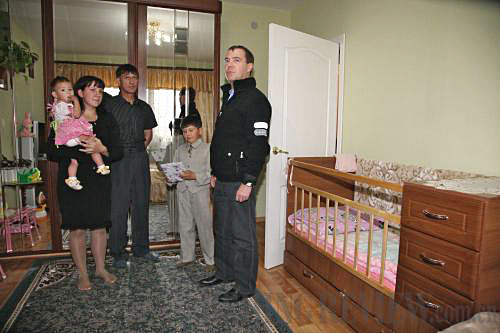|
 |
|
DEMONSTRATING SOVEREIGNTY: Russian President Dmitry Medvedev visits a local family during his tour of one of the four disputed islands, known in Russia as the Southern Kuril Islands, on November 1, 2010 (XINHUA) |
Russia made a strong response to the amendment, considering it "inappropriate" and "unacceptable" and urging Japan to withdraw it. Japan argued the amendment represented the Japanese Government's consistent stance, and Russia had no grounds for commenting on the matter.
Moreover, since the United States is trying to expand the U.S.-Japan alliance and strengthen the Treaty of Mutual Cooperation and Security between the United States and Japan, Japan called on the United States to put the four islands under the cover of the treaty, so as to gain more chips with which to pressure Russia.
For Russia, Japan's hard-line stance on the disputed islands is seen not just as a pure territorial matter, but involves other important matters. Russia sees Japan's behavior as inseparable from the United States' strategy of strengthening its Asia-Pacific military deployment and the U.S.-Japan alliance in order to improve its leverage against Russia. Therefore, Russia felt it must decisively respond to Japan's move.
In July 2010, Russia designated September 2 as the official anniversary marking the end of World War II. This was done to commemorate the Soviet Union's triumph and to remind Japan of its unconditional surrender in 1945. Japan said it was unfortunate Russia had made this move.
On November 1, 2010, Medvedev visited the Kunashir Island—known as the Kunashiri Island in Japan—the first time a Russian head of state had ever visited the disputed islands. Japan protested his visit. Maehara said it would create a serious obstacle to the bilateral relationship. In response, Russia said it was normal for the Russian president to inspect Russian territory and Japan's statement was unacceptable.
Then Medvedev dispatched several high-ranking officials, including the Russian defense minister and regional development minister, to visit the four islands to map out future defense and economic development programs there, showing Russia's determination to strengthen control of the four islands.
The Japanese Government designated February 7 "Northern Territories Day" in 1981. On that day this year, some Japanese right-wing groups held demonstrations in front of Russia's Embassy in Tokyo and burned the Russian national flag. On the same day, Japanese Prime Minister Naoto Kan delivered a speech demanding the return of the Northern Territories. He condemned Medvedev's visit to one of the islands last November, calling the move "intolerable." He also said the issue of the Northern Territories is extremely important to Japan's foreign policy, and reiterated Japan's commitment to solving this problem.
Thereafter, both sides displayed a tough stance. With Japan accusing Russia of damaging bilateral relations, Russia started to deploy modern weapons on the islands, and planned to promote the development of the islands.
Uncertain prospects
Both sides are losing patience, having spent much time trying to resolve the territorial dispute. Since the Japanese people still hope to take back the Northern Territories, the problem has become a test of Japanese politicians' wisdom and patience. Therefore, no Japanese political party, or politician, dares to give in, even a little.
Maehara said he would try his best to get the islands back, even if the attempts cost his political future. But his toughness is meant largely to assuage domestic concerns and accumulate political capital. He actually is quite clear about the difficulties. It is evident to all that Japan faces mounting difficulties in taking back the disputed islands, and hopes of regaining them are fading.
In Russia, no one is willing to give up the Southern Kuril Islands. Putin once said not an inch of Russia's vast land is unwanted, showing the country's unyielding stance on the territorial dispute. It is obvious there is almost no chance for Russia to make a compromise.
With its growing national strength, Russia is likely to respond to Japan with an even tougher attitude. In fact, Medvedev's recent gesture hinted Russia might not return to the negotiating table to settle the dispute. Some Russian scholars have pointed out that it makes little difference whether or not a peace treaty is signed between Russia and Japan. They have also said it is not necessary for Russia to return two of the four islands to Japan in accordance with the 1956 statement.
By strengthening military deployment on the four islands and dispatching strategic bombers to patrol the airspace over the islands, Russia is militarily ready for any possible challenge from the Japanese side, casting more shadows on the potential for settling the problem in the future.
The author is a research fellow with the Institute of Russian Studies at the China Institutes of Contemporary International Relations | 